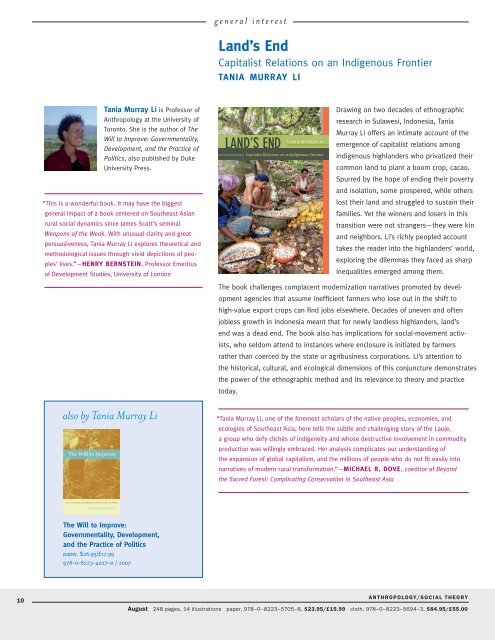x1vuD
x1vuD
x1vuD
Create successful ePaper yourself
Turn your PDF publications into a flip-book with our unique Google optimized e-Paper software.
general interest<br />
Land’s End<br />
Capitalist Relations on an Indigenous Frontier<br />
tania murray li<br />
Tania Murray Li is Professor of<br />
Anthropology at the University of<br />
Toronto. She is the author of The<br />
Will to Improve: Governmentality,<br />
Development, and the Practice of<br />
Politics, also published by Duke<br />
University Press.<br />
“This is a wonderful book. It may have the biggest<br />
general impact of a book centered on Southeast Asian<br />
rural social dynamics since James Scott’s seminal<br />
Weapons of the Weak. With unusual clarity and great<br />
persuasiveness, Tania Murray Li explores theoretical and<br />
methodological issues through vivid depictions of peoples’<br />
lives.”—HENRY BERNSTEIN, Professor Emeritus<br />
of Development Studies, University of London<br />
tania murray li<br />
LAND’S END<br />
Capitalist Relations on an Indigenous Frontier<br />
Drawing on two decades of ethnographic<br />
research in Sulawesi, Indonesia, Tania<br />
Murray Li offers an intimate account of the<br />
emergence of capitalist relations among<br />
indigenous highlanders who privatized their<br />
common land to plant a boom crop, cacao.<br />
Spurred by the hope of ending their poverty<br />
and isolation, some prospered, while others<br />
lost their land and struggled to sustain their<br />
families. Yet the winners and losers in this<br />
transition were not strangers—they were kin<br />
and neighbors. Li’s richly peopled account<br />
takes the reader into the highlanders’ world,<br />
exploring the dilemmas they faced as sharp<br />
inequalities emerged among them.<br />
The book challenges complacent modernization narratives promoted by development<br />
agencies that assume inefficient farmers who lose out in the shift to<br />
high-value export crops can find jobs elsewhere. Decades of uneven and often<br />
jobless growth in Indonesia meant that for newly landless highlanders, land’s<br />
end was a dead end. The book also has implications for social-movement activists,<br />
who seldom attend to instances where enclosure is initiated by farmers<br />
rather than coerced by the state or agribusiness corporations. Li’s attention to<br />
the historical, cultural, and ecological dimensions of this conjuncture demonstrates<br />
the power of the ethnographic method and its relevance to theory and practice<br />
today.<br />
also by Tania Murray Li<br />
“Tania Murray Li, one of the foremost scholars of the native peoples, economies, and<br />
ecologies of Southeast Asia, here tells the subtle and challenging story of the Lauje,<br />
a group who defy clichés of indigeneity and whose destructive involvement in commodity<br />
production was willingly embraced. Her analysis complicates our understanding of<br />
the expansion of global capitalism, and the millions of people who do not fit easily into<br />
narratives of modern rural transformation.”—MICHAEL R. DOVE, coeditor of Beyond<br />
the Sacred Forest: Complicating Conservation in Southeast Asia<br />
The Will to Improve:<br />
Governmentality, Development,<br />
and the Practice of Politics<br />
paper, $26.95/£17.99<br />
978–0–8223–4027–0 / 2007<br />
10<br />
ANTHROPOLOGY/SOCIAL THEORY<br />
August 248 pages, 14 illustrations paper, 978–0–8223–5705–6, $23.95/£15.99 cloth, 978–0–8223–5694–3, $84.95/£55.00


